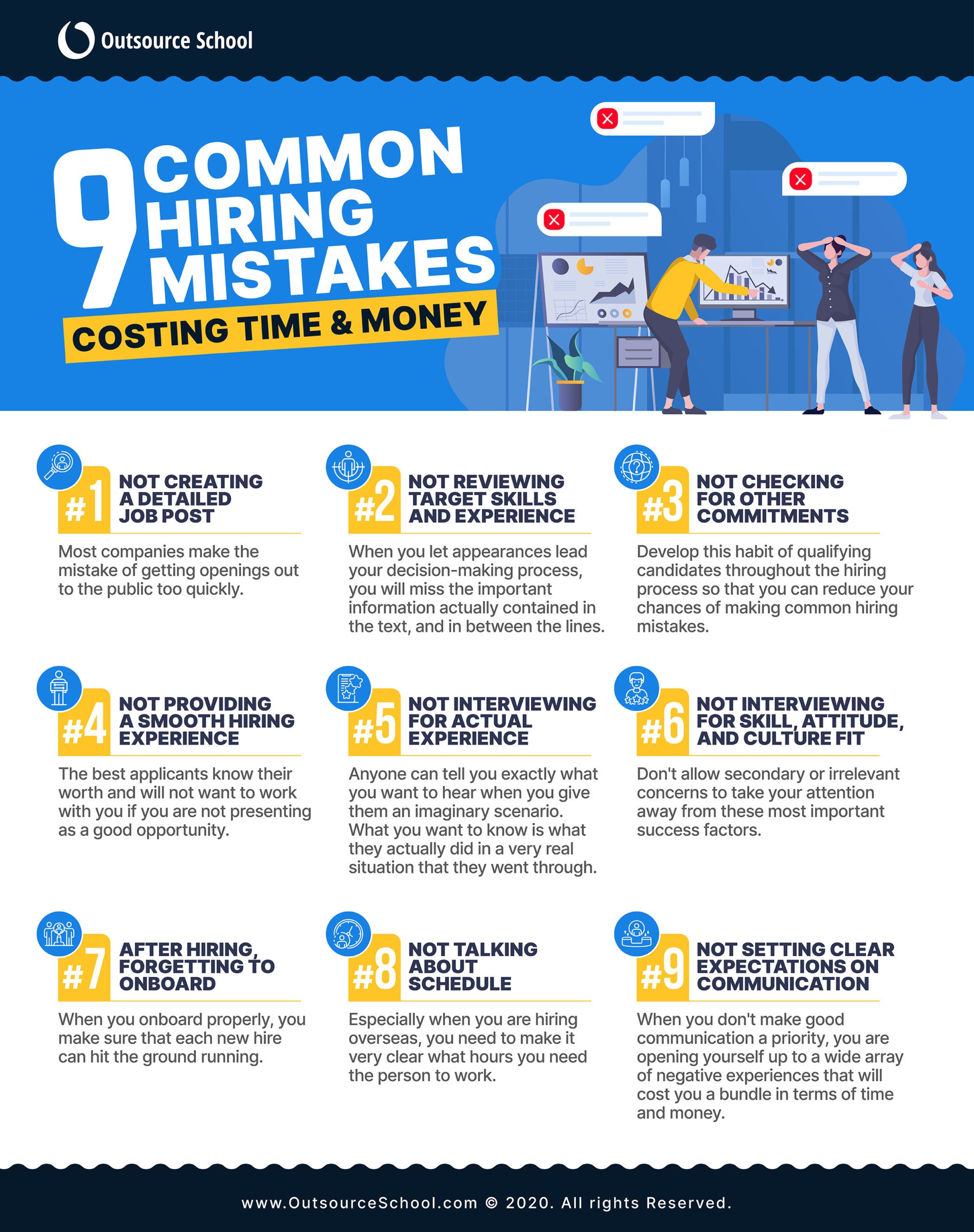. Wre you making any of these 9 common hiring mistakes? If you are, it’s very likely costing you lots of time and money! This means both hard costs — actual money out — and opportunity costs. Common hiring mistakes can bleed you of these two valuable resources. They can also hurt your company growth.
Your company leadership team is responsible for a vitally important function. They select, interview, hire, onboard, train, and integrate talent into your business. If you’re a small business, this likely means that the job falls to the business owner.
It’s time to evaluate your business’s hiring practices so you can stop making these common hiring mistakes. So, here are the 9 common hiring mistakes that you should make sure you are not making in your business.

(1) Not Creating a Detailed Job Post
Most companies make the mistake of getting openings out to the public too quickly. Sure, time is of the essence, but being careless about posting openings invites a lot of unqualified candidates. You may save a bit of time and money by just scribbling out whatever comes to mind. But don’t post what you have only at the moment that you put out your ad. Hastily filling out a form on a hiring marketplace can backfire. You will stand to lose a lot more by not taking your time. The better tack is to thoughtfully jot down a clear description. Then you can attract the exact person you are looking for to fill a role.
First of all, you must know and clearly list out the skills (both hard and soft). Then describe the type and level of experience that the perfect candidate must have. Add in the responsibilities that they must take on, and the deliverables that you expect. This will then guide you in crafting a recruitment strategy and interview flow. The right one will help you avoid common hiring mistakes throughout the hiring process.
(2) Not Reviewing Target Skills and Experience
Many business owners skip the vital step of reviewing the information that candidates submit. This process can be tedious and time-consuming. So, they just speed-read through the applications and end up looking more at how they are formatted. But don’t let appearances lead your decision-making process. You will miss the important information actually contained in the text, and in between the lines.
Sometimes, business owners are keen on certain skills, experiences, and character traits. That’s a good thing, but it can be manipulated. Candidates can throw in these “buzzwords” to grab the attention of someone who is simply skimming through applications. Don’t be easily wowed by a candidate’s awesome experience. You may learn later on that it is not relevant to your immediate needs. It can be hard to let go of someone you’ll definitely want to have on your team in ten years. But think — are you really prepared to sustain this person until you get there? And if you indeed maintain that same plotted path?
Only entertain candidates who have the sets of skills and types and level of experience that they need to do the exact work that you need them to do at this stage, right now.
(3) Not Checking for Other Commitments

In the world of employment, this means allowing candidates to look around for other opportunities while you interview them. In the world of freelancing, you can’t really expect candidates to sit around and wait for you to choose them. This is true in any scenario if you are hiring for a part-time position. You can, however, always ask candidates nicely if they can commit to holding off for a set number of days to give you — and them! — some time to see if it’s the right fit and make a decision. Most A-players will appreciate this, and then you’ll get the bonus of confirming that they have a good attitude and are therefore a good choice.
If you are doing hiring right, you will spend a lot of time and effort in the later stages of hiring. This is one of the common hiring mistakes that has smaller components. So, that said, you want to make sure that you are not investing in people who will turn around and take a different job at the drop of a hat. Early on in the hiring process, make sure that you confirm that each of the best candidates is indeed interested in the role that you are offering. Before you get to the interview stage, confirm that the final top choices are sure that they want to take the position. Ask them why as well. This will give you a lot of clues as to how much they want to join your company. If they give you any indication that they are playing the field, ask them about it straight out. Develop this habit of qualifying candidates throughout the hiring process so that you can reduce your chances of making common hiring mistakes.
(4) Not Providing a Smooth Hiring Experience
The best applicants for any position are not desperate people. Forgetting this will get you to fall into this most slippery of common hiring mistakes. The best applicants know their worth and will not want to work with you if you are not presenting as a good opportunity. This might be a clunky application page, poor response times, or coming to an interview unprepared — yes, the best candidates can tell!
Top talent evaluates clients and opportunities just as you evaluate them and their applications. They appreciate an experience that does not make them jump through unnecessary hoops or make them feel like they are not respected. It doesn’t take a lot to simplify the process so that you can show that you value candidates’ time and don’t want to leave them hanging.
(5) Not Interviewing for Actual Experience
The easy way to prepare for interviews is to have pre-set questions that you ask every candidate. The problem with this is that your questions will be hypothetical. It’s really easy to answer hypothetical questions. Anyone can tell you exactly what you want to hear when you give them an imaginary scenario. What you want to know is what they actually did in a very real situation that they went through.
Once again, spending less time preparing may seem to be a good use of time, but ends up putting you in a place where you are more likely to make a mistake.
(6) Not Interviewing for Skill, Attitude, AND Culture Fit

If you have not identified the handful of must-have skills for a position, then you will not be able to conduct a proper interview. You will end up just having a conversation instead of getting down to the specifics that will help you hone in on the perfect fit. This wastes a lot of time, energy, and money.
In terms of attitude, you must know what character traits you want within your workforce. Attitude bleeds into teams, so you want to make sure that you are targeting the traits that will have a positive impact on the whole. If you do not confirm that a candidate has the right attitude during the interview, then you are headed for a bad hire, regardless of their skills and experience.
The pitfalls for culture are similar to what was said above about attitude. Your culture is a vital, living force for your business. You don’t want to make decisions that will turn it against your business because you did not cover culture fit during the interview process. Consider as well that an otherwise good candidate will not be able to perform well and be successful in the role you are hiring for if they are not a good culture fit. This imbalance will quickly turn a good candidate sour and hurt your business.
Make sure you evaluate properly and make your final selection based on the handful of key, non-negotiable qualities that you have thoughtfully determined for the role. Don’t allow secondary or irrelevant concerns to take your attention away from these most important success factors.
(7) After Hiring, Forgetting to Onboard
Hiring someone is just the first step in their official experience with your company. Of all these 9 common hiring mistakes, onboarding is the one that most companies make knowingly. Most business owners just don’t see the value in designing and maintaining an actual system for bringing new hires onboard. They think that they can just wing it and that this works out better. In our experience, it most definitely does not.
When you fail to onboard new hires, you miss a vital opportunity to get them properly settled in. This means that the new hire will be uncomfortable as they start work, which leads to poor performance right off the bat. They are likely to be stressed, unhappy, and unable to perform at their normal level — forget about peak performance. Onboarding is an essential process that prepares any new hire to enter a new environment. No matter what kind of experience they have under their belts, your company is unique. They need guidance to fit in perfectly. When you onboard properly, you make sure that each new hire can hit the ground running.
(8) Not Talking About Schedule
Probably the most common of our 9 common hiring mistakes is not discussing work times. We could have covered schedules in the points on interviewing and onboarding, but we feel that this deserves its own special spot because it’s so common and so important.
Most business owners assume that hires will conform to their schedules, no matter what they are. This is because a lot of businesses still have a hangover from the olden days when everyone worked the 8 or 9 to 5 grind. Some business owners also expect hires to conform simply because they are the “boss” and hires must do whatever they say, no questions asked. Sure, you have the right to expect compliance and service because you’re paying for it. However, the attitude is what’s important here.
Before the interview and during onboarding, you need to confirm and reconfirm working times. Don’t assume anything, and don’t carry expectations that you have not laid out plainly. Especially when you are hiring overseas, you need to make it very clear what hours you need the person to work. If some of this is actually flexible, it’s better that you allow flexi-time. When you have identified the top candidates, consider what times this schedule means for them. You may be looking at someone who lives halfway across the world, for example. Are they available during those times? Will they be effective working those hours? You must be absolutely certain before you move ahead with a hire.
(9) Not Setting Clear Expectations on Communication

This is another of the 9 most common hiring mistakes that merits its own place. It must be discussed and confirmed during the interview and during onboarding, but with special emphasis.
Communication is one of the most important factors in ensuring good results from our teams. We have discovered this in doing business for over a decade. If you are not thinking about communication throughout the entire hiring process, you are missing a key element that can spell the difference between a good and a bad hire. Poor communication for us means automatic disqualification, regardless of skills, attitude, experience, or cultural fit. In fact, we have made it part of our non-negotiable soft skills, and it is a huge part of our culture.
When you don’t make good communication a priority, you are opening yourself up to a wide array of negative experiences that will cost you a bundle in terms of time and money.
Avoid Common Hiring Mistakes
Stop making common hiring mistakes so you can start making good hires. Valuable team members make good use of their time and yours, and bring more money into the company. Think of it this way. What you lose from a bad hire is easily what you gain every year when you make a good hire. And that’s just for starters. Every good hire grows, and as they grow, so does your business.
Would you like to know how to be certain who your next hire should be? Or maybe you are having a hard time deciding what parts of your business can be outsourced with virtual assistants, right now. We can help you answer these questions. We can help you to discover what new systems you should add to scale your business faster. Set up a free hiring consultation with us at Outsource School today – simply book here!








